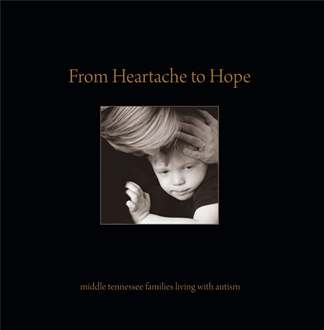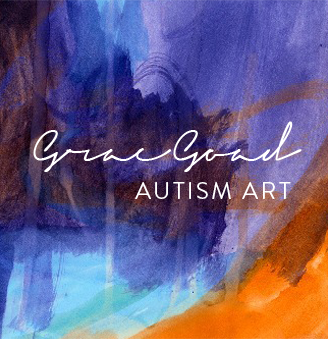You may have heard, read or seen the flap on the news. Parents of children on the autism spectrum and adults with high-functioning forms, such as Asperger's are. Not. Happy. Frankly, it's all so confusing and I was none to excited to write about this. But, it is extremely important to our community. Truth is we still don't know how this will all shake down in the very end–as far as how those playing with our lives will draw the lines that determine understanding, perceptions and most importantly, services. We've been hearing unpleasant rumblings from the sessions amongst these shirts for quite sometime, serving to increase our collective anxiety. Meantime, here's a perspective from Spectrum Mom, who guest posted here on "The Journey with Grace" last year:
"When a psychiatrist diagnosed my two year old son with PDD-NOS[*], an autism spectrum disorder, I wanted to deny it, to wish the problem away. So while getting all the services I could for him, I told as few people as possible. One of the people I didn’t tell was his new pediatrician, who then cancelled my son’s occupational therapy without talking with or even informing me. Because he did not know the specific diagnosis, he assumed that I and the Tennessee Early Intervention System were frivolously wasting money on a service my child did not need. My son lost weeks of early intervention, and I learned an important lesson. Even if you hate the idea of labeling your children, a diagnosis is vital to getting the help that will shape their future.
"Now the American Psychiatric Association (APA) wants to severely limit the number of children who will get that diagnosis and that help. The APA plans changes to the definition of autism in the fifth edition of the Diagnostic and Statistical Manual of Mental Disorders (DSM 5). An analysis by Yale University researchers concludes the new definition will result in far fewer diagnoses of autism.
"Again and again I have read responses to this analysis that the reduction in diagnosed cases of autism will result in more resources for those most severely affected. This suggestion rests on a belief that need generates resources. Unfortunately, need is only the beginning. What generates resources is demand. Any parent with a child with autism knows that resources must be searched for, demanded, and paid for, often by the parents, sometimes by a combination of parents, insurance, and public money.
"Having a child with autism is difficult and costly to the family. Parents must seek out, travel to, and pay for therapy when the child is out of school; and repeatedly request and constantly monitor when the child is in school. There is [little to] no free money for parents of children with autism. [See "The Journey with Grace" post "Autism: The Financial Fiasco"]
"So now, officially, there will be far fewer children diagnosed with autism. How convenient for the insurance companies! How obliging of the creators of the DSM to split up the diagnosis into smaller, divided groups so that parents will now have to compete against one another instead of lobbying together.
"And the worst part is that some parents will get some new diagnosis like Communication and Socialization Disorder and think “Well, at least my child doesn’t have autism,” and not realize that all the research and resources that could help their child are tied to autism.
"The problems that these children have will not go away — rather, families will lose the access to timely and affordable help that can change children’s lives and help them become more successful as adults. If you have concerns about this change, please send an email to DSM5@psych.org about the definition of Autism Spectrum Disorders in the DSM-5."
______________________________________________________________________________________
I'll add that by enabling children when they are young, we raise them to be tax payers and not simply tax users. Our culture is extremely short-sighted in terms of recognizing the value of investing in education in the NOW for the benefit for ALL tomorrow. It is an effective cost measure to the benefit of greater society.
While Spectrum Mom addresses PDD-NOS, regarding the criteria, Asperger's will likely meet a similar fate…just as we were making significant gains in our community in understanding, tolerance and inclusion. Damn!
An additional perspective from Nashville-based Gaynell Payne, The Examiner — "Stopping an Epidemic by Redefining It."
*PDD-NOS: Pervasive Developmental Delay-Not Otherwise Specified; a form of autism that meets some of the criteria for autism but not all [blah-blah-blah]
A version of SpectrumMom's article appeared today in Canadian-based online news source, Straight Goods.





that sensory inrcesspog issues are linked to social problems. Shouldn’t the focus be on figuring how and why they are linked rather than inventing boxes to put the children in? (3) 16.5% of the children in the referenced study had significant sensory symptoms? 16.5%? At a certain point, isn’t it kind of hard to characterize something as a “disorder” if nearly 2 children out of 10 exhibit the “symptoms”? (4) Shouldn’t the purpose of diagnosing a person’s problems be to help figure out how to help the person with the “diagnosis” — either help them recover or help them cope? Does a diagnosis of ASD today actually lead to good help from the medical establishment? How many of us had any idea what to do to help our child once we got a diagnosis? How many of us had to figure out on our own that our child is nothing like the vast majority of the other children out there with ASD? On the other hand, once you figured out (on your own, probably) that your child had sensory inrcesspog deficiencies, did you then have some clearer idea how to help him or her? I think the idea that SPD has to stand alone to have merit should be reconsidered. Not that anybody’s asking me, of course ….